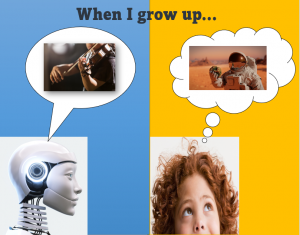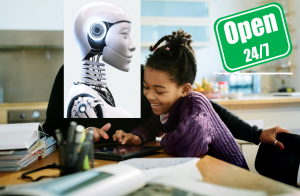Speculative Future 1 (Dystopian):

Emily is 5 years old and she will be starting Kindergarten this September, 2051. Today is the day she gets her kinder shots, and her parents are both excited and anxious to finally receive the insight and prediction of Emily’s future professional career. Emily’s parents have gathered all the artifacts and records of the first 5 years of Emily’s life, and they submit them to a computer and AI analyzes the data and tells the parents their child’s future career path. Often what AI predicts the future of a child can be far different from what the child wants to be when he or she grows up and it can bring disappointments, frustrations, and challenges. Before participating the future career prediction program, parents should agree that they would not reveal the future professions to their children for the analysis results to be accurately applied to their children’s future. Just as with any agreements, accidents can happen, and some children can be unintentionally exposed to their AI generated future predictions. Some may feel happy and impressed with their future prediction and decide not to put their best effort into their lives just because they feel their perfect lives are already mapped out for them; others fall into despair and disappointments because of the difference between the prediction and the desire. Some may feel that they can challenge the AI and become what they want to be to prove against the AI prediction. But would taking a different career path against the prediction make the person’s life happier and more satisfying? Maybe what the AI “suggests” could be for the human’s happiness, success, and wellbeing in the future. Also, another possibility is that some organizations can sneak into behind the design and manipulate the algorithm to “balance” out the variety of jobs in the future. I really cannot tell the true intention of the AI future diagnosis program until how the algorithm is designed and how the data is analyzed.
Speculative Future 2 (Utopian):

Emily is 5 years old and she will be starting Kindergarten this September. In 2051, there are still physical school buildings exist in public education, but a lot of children are learning from home with the help of AI super Teaching Assistant (TA). In the past, especially during the COVID pandemic in 2020 when schools were locked down, home schooling or distance learning was challenging for many working parents to find balance between their work and their children’s education. Thanks to the development of AI super TA and its availability 24/7, now parents can afford to homeschooling their children even if they have to work during the school hours and students can receive instant assistance and personalized learning in their education by AI super TA. Also, this development of AI super TA has resolved the childcare crisis in the past: shortage of childcare workers, facilities and increased cost of child care.
Inspiration: https://engineering.stanford.edu/magazine/article/how-ai-based-super-teaching-assistant-could-revolutionize-learning